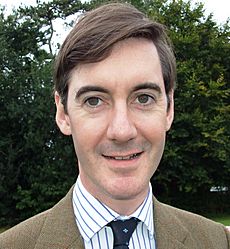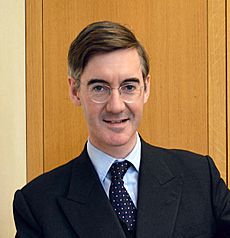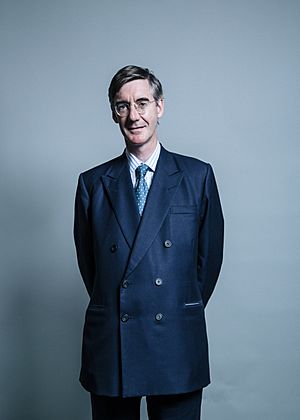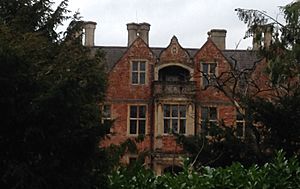Jacob Rees-Mogg facts for kids
Quick facts for kids
Sir Jacob Rees-Mogg
|
|
|---|---|
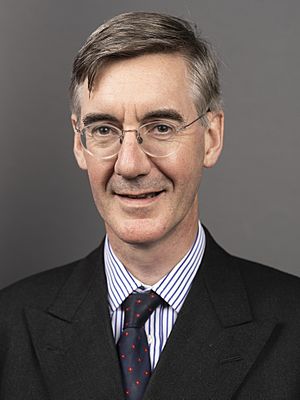
Official portrait, 2022
|
|
| Secretary of State for Business, Energy and Industrial Strategy | |
| In office 6 September 2022 – 25 October 2022 |
|
| Prime Minister | Liz Truss |
| Preceded by | Kwasi Kwarteng |
| Succeeded by | Grant Shapps |
| Minister of State for Brexit Opportunities and Government Efficiency | |
| In office 8 February 2022 – 6 September 2022 |
|
| Prime Minister | Boris Johnson |
| Preceded by | The Lord Agnew of Oulton |
| Succeeded by | Office abolished |
| Leader of the House of Commons Lord President of the Council |
|
| In office 24 July 2019 – 8 February 2022 |
|
| Prime Minister | Boris Johnson |
| Preceded by | Mel Stride |
| Succeeded by | Mark Spencer |
| Chair of the European Research Group | |
| In office 9 January 2018 – 3 September 2019 |
|
| Deputy |
|
| Preceded by | Suella Braverman |
| Succeeded by | Steve Baker |
| Member of Parliament for North East Somerset |
|
| In office 6 May 2010 – 30 May 2024 |
|
| Preceded by | Dan Norris |
| Succeeded by | Dan Norris |
| Personal details | |
| Born |
Jacob William Rees-Mogg
24 May 1969 London, England |
| Political party | Conservative |
| Spouse |
Helena de Chair
(m. 2007) |
| Children | 6 |
| Parent |
|
| Relatives | Annunziata Rees-Mogg (sister) |
| Education | |
| Signature | |
Sir Jacob William Rees-Mogg (born 24 May 1969) is a British politician and broadcaster. He is a member of the Conservative Party. From 2010 to 2024, he was the Member of Parliament (MP) for North East Somerset. An MP is a person elected to represent their local area in the House of Commons.
During his time in government, Rees-Mogg held several important jobs. He was the Leader of the House of Commons from 2019 to 2022 and the Secretary of State for Business, Energy and Industrial Strategy in 2022. He was a strong supporter of Brexit, the United Kingdom's exit from the European Union.
Rees-Mogg is known for his traditional views and old-fashioned style. This has led some people to call him the "Honourable Member for the 18th century". Since 2023, he has also worked as a presenter for the TV channel GB News.
Contents
Early Life and Education
Jacob Rees-Mogg was born in Hammersmith, London, on 24 May 1969. His father, William Rees-Mogg, was a well-known newspaper editor who later became a life peer. This means he was given a special title that allowed him to sit in the House of Lords, another part of the UK Parliament.
Jacob grew up in Somerset, England. He was mainly looked after by his family's nanny, Veronica Crook, who also cared for his older siblings and later his own children. She worked for the family for over 50 years.
Early Interest in Finance
When Jacob was ten, he received £50 from a relative. His father helped him invest this money in shares of a company called General Electric Company (GEC). This sparked Jacob's interest in the stock market. He learned to read company reports and even attended shareholder meetings, where he would ask questions about how the companies were run.
School and University
Jacob went to Westminster Under School and then to Eton College, a famous boarding school. After Eton, he studied history at the University of Oxford, where he was also the president of the Oxford University Conservative Association. This group is for students who support the Conservative Party.
Career Before Politics
After graduating from university in 1991, Rees-Mogg started working in finance. He worked for a company in London and then moved to Hong Kong in 1993.
In 2007, he co-founded his own investment management company called Somerset Capital Management. The company was very successful, and Rees-Mogg became very wealthy. Even after becoming an MP, he continued to earn money from the company as a partner until he joined the government cabinet in 2019.
Political Career
Early Campaigns
Rees-Mogg's first attempt to become an MP was in the 1997 general election. He was the Conservative candidate for Central Fife in Scotland, a seat that usually voted for the Labour Party. He did not win, getting only 9% of the vote.
He tried again in the 2001 general election in The Wrekin, a constituency in Shropshire, but was unsuccessful again. Some people thought his posh accent made it hard for him to connect with voters, but he said it was "pathetic to fuss about accents too much."
Becoming a Member of Parliament
In the 2010 general election, Rees-Mogg was finally elected as the MP for the new constituency of North East Somerset. He won with a majority of 4,914 votes.
In the House of Commons, he became known for his funny speeches and for filibustering. A filibuster is when a politician gives a very long speech to delay or stop a new law from being passed. He once tried to amend a bill to give his home county of Somerset its own time zone, 15 minutes behind London.
During this time, he often voted against his own party's leaders on issues like the European Union. He was a strong Eurosceptic, meaning he was critical of the UK's membership in the European Union.
Brexit and the May Government
Rees-Mogg was a leading voice in the campaign for the UK to leave the EU, known as Brexit. He campaigned for the "Leave" side in the 2016 referendum.
After Prime Minister David Cameron resigned, Theresa May took over. Rees-Mogg became the chairman of the European Research Group (ERG) in 2018. The ERG was a group of Conservative MPs who wanted a "hard Brexit," meaning a complete break from the EU's rules.
He was very critical of Prime Minister May's Brexit plan, called the Chequers Agreement. He said it was like "staying in the EU without a vote." In November 2018, he submitted a letter of no confidence in Theresa May, trying to remove her as leader, but she won the vote.
Johnson and Truss Governments
When Theresa May resigned in 2019, Rees-Mogg supported Boris Johnson to become the new leader. When Johnson became Prime Minister, he appointed Rees-Mogg as Leader of the House of Commons. This was his first major role in government.
In September 2019, he was criticised after a photo showed him relaxing on the front bench in the House of Commons during an important debate. Later that year, he apologised for comments he made about the Grenfell Tower fire.
In February 2022, Johnson moved him to a new role as Minister of State for Brexit Opportunities and Government Efficiency. After Johnson resigned, Rees-Mogg supported Liz Truss to be the next Prime Minister. When she won, she made him the Secretary of State for Business, Energy and Industrial Strategy. He held this job for a short time, as Truss resigned after just 49 days.
Return to the Backbenches
When Rishi Sunak became Prime Minister in October 2022, Rees-Mogg left the government and returned to being a regular MP, known as a "backbencher."
In the 2024 general election, Rees-Mogg lost his seat in Parliament to the Labour Party candidate, Dan Norris.
Political Views
Jacob Rees-Mogg's political views are often described as traditional and conservative. He is a strong supporter of the British monarchy.
Views on the European Union
He is a strong supporter of the UK leaving the European Union (Brexit). He believed that leaving the EU would give the UK more control over its own laws and future. He was a leading figure in the campaign for the UK to leave the EU in the 2016 referendum.
Environment and Climate Change
Jacob Rees-Mogg has expressed views on the environment and climate change. He has suggested that the UK should focus on adapting to climate change rather than trying to stop it, and he believes that targets to reduce carbon emissions can increase energy prices. He has also supported using more fossil fuels.
Social Issues
On social issues, Jacob Rees-Mogg holds traditional views. ..... He has stated that his views on these matters are guided by his Catholic faith.
Media Career
Rees-Mogg has appeared on television and radio many times. In 1999, he was interviewed by the comedy character Ali G.
Since 2018, he has hosted a radio show on LBC. He also has his own podcast called 'The MoggCast'. In 2023, he joined the TV channel GB News as a presenter. In 2024, a reality TV show called Meet the Rees-Moggs was released, following him and his family.
Personal Life
In 2007, Rees-Mogg married Helena de Chair. They have six children. The family lives at Gournay Court, a historic house in West Harptree, Somerset.
Rees-Mogg is a traditionalist Catholic and attends the Traditional Latin Mass. He has said that he is not a "modern man" and once mentioned that he had never changed a baby's nappy.
He is interested in cricket and historic cars. He owns two vintage Bentley cars.
See also
 In Spanish: Jacob Rees-Mogg para niños
In Spanish: Jacob Rees-Mogg para niños
- Moggmentum, a fan movement for Jacob Rees-Mogg.
 | William Lucy |
 | Charles Hayes |
 | Cleveland Robinson |


